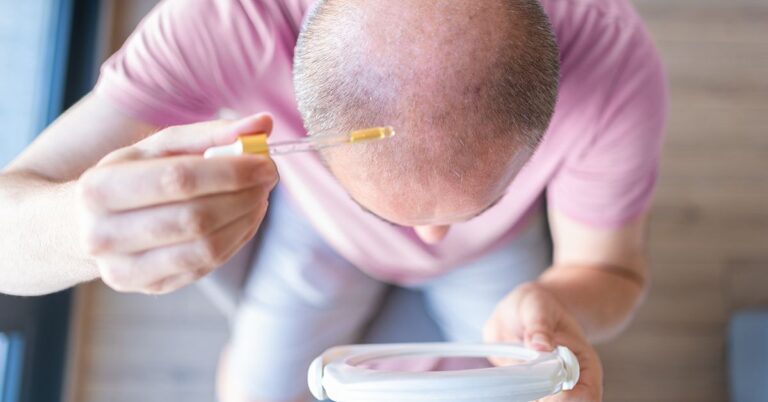Melatonin does not cause hair loss. However, topical melatonin may actually stop or reverse hair loss. Side effects reported with topical melatonin include temporary redness or other color changes, sensitivity, and itching.
Melatonin is a hormone naturally produced by the brain. It is important for circadian rhythms and body clocks. When it gets dark in the evening, the brain produces more melatonin to promote sleep.
Melatonin may also have other effects in the body. For example, it has antioxidant and anti-inflammatory properties and can affect mood.
Melatonin can affect hair health in people with androgenetic alopecia (AGA), which causes male and female pattern hair loss. Researchers estimate that AGA affects more than 50% of older postmenopausal men and 15% of women.
Melatonin is not involved in hair loss due to AGA. In fact, it may stop hair loss or promote hair growth. Read on to learn more.
There is no evidence that melatonin causes hair loss. In fact, there is evidence to the contrary. Melatonin may help stop hair loss and promote hair growth.
What causes male pattern baldness?
Androgens, specifically dihydrotestosterone (DHT), are the hormones responsible for AGA. These chemical messengers play a variety of roles in the body, including involvement in the hair growth cycle.
There is some evidence that applying topical melatonin directly to the skin or scalp may stop or even reverse hair loss.
A 2023 study reviewed the results of 11 studies of topical melatonin in people with hair loss. Most studies report that topical melatonin has the following effects:
Improved hair growth on the scalp Improved hair density on the scalp Increased hair thickness
A 2024 review states that studies have found that melatonin has anti-androgenic effects and is also involved in regulating hair growth. Researchers have compiled several clinical studies in which melatonin was found to have beneficial effects on hair loss.
How does melatonin help hair growth?
Although research is ongoing, some studies have begun to uncover the mechanisms by which melatonin helps hair growth.
A 2022 study used cells from the lab to model human hair follicles. The results showed that dermal papillae, the cells involved in sending signals for hair growth, had higher levels of melatonin receptors.
This means that melatonin binding to melatonin receptors in this area may promote hair growth. The researchers found that adding melatonin to the model increased the expression of genes associated with hair growth.
A 2024 study in mice supported this by finding that melatonin speeds up the hair cycle. Melatonin promoted hair growth-related signaling in the dermal papilla and triggered hair growth-promoting signaling in hair follicle stem cells.
More research is needed on people.
Topical use of melatonin does not seem to have any serious side effects. An older review notes that participants in some studies of topical melatonin for hair loss reported mild but temporary side effects, including:
You may know that oral melatonin supplements are often used to promote sleepiness. Because of this, it’s no wonder you wonder if topical melatonin can cause drowsiness.
A small 2016 study investigated this. Researchers asked 10 healthy participants to apply a high dose (12.5%) melatonin cream to 80% of their skin. However, no significant cognitive effects such as drowsiness were observed.
Certain procedures may also be used for hair removal, such as:
A variety of topical melatonin products are available. These usually come in the form of serums that you apply to your scalp.
There is no fixed treatment for topical melatonin. A 2023 study analyzed previous studies and showed that the effective dose is 0.0033% to 0.1% topical melatonin applied once daily for 90 to 180 days.
If in doubt, we recommend consulting your doctor before trying topical melatonin for hair removal. We can provide specific recommendations on exact usage.
Melatonin does not cause hair loss. However, topical melatonin may be beneficial in preventing further hair loss or promoting hair growth. More research is needed on people.
Mild side effects associated with topical melatonin are limited.

